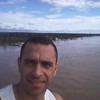In 2003, I finished the Residency in Orthopaedic Surgery at a public hospital in Rio de Janeiro, Brazil, city where I was born and raised. At the same year, I joined the Brazilian Army and, in the next year, I went to live in Tefé, a small village at the riverside of The Amazon River. For two years, I travelled through the river to many riverside communities. In a series of actions involving the Brazilian Army, the Amazonas State Government and the christian local churches, I had the privilege and satisfaction of attending these people from the Amazon . These approaches brought medical, dental and spiritual support to the "ribeirinhos", which is the Portuguese word that defines the people that live at the riverside of the Amazon Region in the north of Brazil. That was an unforgettable experience that made me much more human, not only as a doctor, but also as a person. To see that happy people full of hope and optimism and at same time passing through so many problems and without resources made me fall in love with humanitarian medicine. In 2007, I returned to Rio de Janeiro where I worked in The Army Central Hospital performing trauma and knee surgery. Also had a great experience with gunshot complexe orthopaedic wounds in the public hospitals at the violent suburbs of Rio. At that time, I participated in charity health support in the slams, the so called "favelas" and helped drug addicts to recover and get back to society. I converted to Christ at this period and met my wife doing these charity actions. We have two sons, Leonardo and Davi. Thinking of them and searching for a better place to raise them and reinforce our family boundaries, we decided to leave the city of Rio. After a lot of prayer and dificulty, we achieved our objetive and the desire that we believe God has put in our hearts. On january 2017, we arrived at the city of Porto Velho, capital of the state of Rondonia, in the Amazonic Region. I was happy to see the "ribeirinhos" again. I was back to the Braziliam Amazonic Region. Now with my wife and children.
Historians and anthropologists say that the "ribeirinhos" people are a mixture of local indigenous and white poor people that migrated from the dry northeast semidesertic area of Brazil. They live from mineral extrativism, fishing, hunting and basic agriculture in small farms by the rivers. Many of them arrived during the 19th and 20th Century, when rubber extraction ruled the Amazon. Rubber was destinated to exportation to Europe and North America. During the 2nd Wolrd War, Brazilian Government called the "Rubber Soldiers", people from the northeast that entered in the amazon forest to extract rubber from the rubber trees to send them to the war fields to make the tires that transportated the Allies in Europe.
After the 2nd World War and the development of vulcanization, Rubber Extraction entered in decadence. These people remained in the region and the Government did not give support in health, education, living and other social and basic needs. Comparing to the rest of the country, specially the populous and urban Southeast of Brazil, where are the big cities of Rio de Janeiro and São Paulo, the amazonic "ribeirinhos" seem to live in another time. Many of them have no contact with "civilization" and its technology and confort.Their communities have few access to clean water and basic sanitation, which spreads lots of diseases like hepatites, cholera and other infections. The region of Rondonia still suffers with diseases like malaria, leprosy and leishmaniosis. In some villages, it is common to talk and attend old people that never went to a doctor or other health professionals. Some are illiterate because of the lack of schoools. According to christian ministers, the "ribeirinhos" are one of the not reached people by the Gospels in Brazil. Many of these communities have no evangelical churches and many have never heard of Jesus.
I work at the local military hospital and at the biggest emergency trauma hospital of the state. I was inivited to attend the riverside comunnities of the Madeira River near Porto Velho. The period from November to April is the rainny season and the water level of the river can cause big floods. In 2014, the river had the worst flood in its history. Some scientists believe this flood ocurred because of the construction of hidrelectric power plant of Santo Antônio. Many houses at the riverside drowned and people lost everything. The infestation of tropical diseases like malaria, zika, dengue, yellow fever and gastrointestinal ilnesses was huge. Theses areas still suffer the consequences of this flood. The basic health units have a great lack of professionals and resources. Lots of these communities have not christian ministers. I have been praying and The Lord have been revealing that our purpose here is to take care of our children and reach these communities. My wife is studying Nursery at the local university and we are active in a local baptist church. Our spiritual leader, Pastor Diego have a great experience with drug addicts support. He was living in Rio de Janeiro and attended to God´s call to come to this region. We believe that the Lord put us together to unit my experience with the "ribeirinhos" and his experience with drug addicts to reinforce a ministery that will reach the urban and rural area of Rondonia.
The photos were taken on march 2017 with my wife and sons, during the first mission trip to the "ribeirinhos" in the Back to the Amazon and with Pastor Diego and our local church. Please pray for us and for this ministery. Pray for the "ribeirinhos". We believe that the Lord will make great things through our lives in this remot area. Thank you for your attention and may Jesus bless all. Hope to share more stories!
























